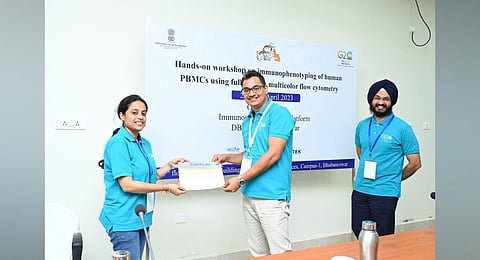

BHUBANESWAR: Experts in the field of biotechnology and clinical diagnostics stressed on use of advanced technology and gaining expertise for multidisciplinary research in frontier areas of life sciences.
At a three-day special training programme at the Institute of Life Sciences (ILS), Bhubaneswar, senior scientist Dr Sunil Raghav said application-oriented basic research in life sciences using cutting-edge technologies can lead to correct evaluation and identification of diseases.
A group of PhD and master's students from different universities and faculty members from prestigious institutes like AIIMS and PGI were imparted training on advanced technology for the identification of T-cell responses against Covid-19 in human peripheral blood mononuclear cells (PBMCs) of vaccinated individuals, on this occasion.
Raghav said the participants were trained on the basics of advanced full spectrum flow cytometry using Cytek-Aurora 5-laser flow cytometer and how to identify the T-cell responses against Covid-19.
Flow cytometry is a technique to analyze cells at a single-cell resolution and identify if proteins/cell numbers are increased or decreased upon any treatment or disease. It is used in clinical diagnostics for several diseases including blood cancer, and HIV infection and for vaccination trials for assessing the immune responses of individuals, he said.
Traditional flow cytometer machines could analyze up to 16 fluorochrome detections in a single tube but with the advancement of the full spectrum technique now it is possible to detect up to 64 fluorochromes in a single tube. This method allows one to perform analysis using less volume of clinical samples like blood or bone marrow from patients, Raghav added.
ILS has set up the advanced full-spectrum Cytek 5-laser instrument with the support of the Biotechnology Industry Research Assistance Council (BIRAC) to perform immunogenicity analysis.
This state-of-the-art facility will be beneficial to hospitals and diagnostic centres in Bhubaneswar for analysing clinical samples like acute myeloid leukaemia (AML)/measurable residual disease (MRD) as it would increase the sensitivity and precision of the diagnosis method.
The participants were trained on handling the human blood samples, isolation of PBMCs, preparation of fluorochrome antibody pools, and cell staining followed by training sessions on data analysis to identify Covid-19 antigen-activated CD4 helper and Cytotoxic CD8 T-cells.
The three-day training workshop on 'Immunophenotyping of human PBMCs using full spectra multicolor flow cytometry' was organised under the ambit of the G20 Jan Bhagidari Programme at the Immunogenicity assay platform set up at ILS with the support from BIRAC under Covid Suraksha Mission.
The workshop was inaugurated by RMRC director Dr Sanghamitra Pati and attended by MD of GenX Diagnostics Dr Biswajit Mohanty. They lauded the workshop with praises and appreciation for its uniqueness and one-of-a-kind approach towards skill development in high-end instrumentation techniques.